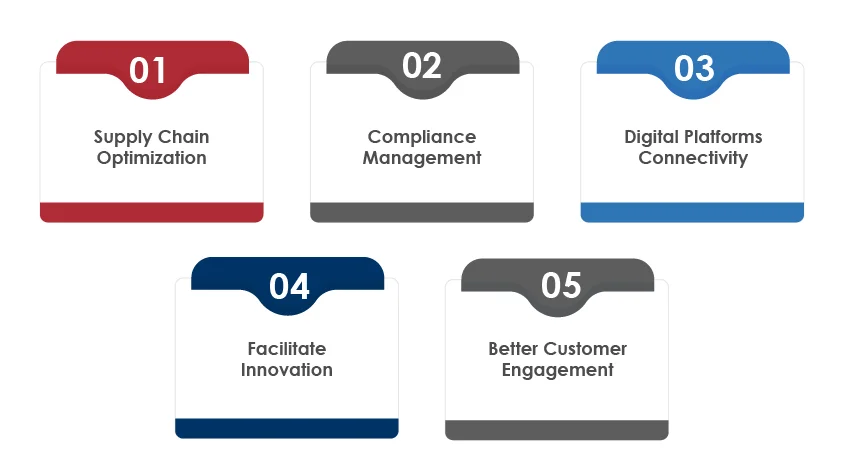- Intelligent Automation in Manufacturing Industry
- IA Technologies Transforming the Manufacturing Sector
- Benefits of Intelligent Automation in Manufacturing
- KPIs to Measure Intelligent Automation Impact in Manufacturing
- How can Tx Assist with Automation in the Manufacturing Industry?
- Summary
The manufacturing industry hasn’t been left untouched by the industry 4.0 revolution. It is driven by the need for efficiency, adaptability, and precision. Unlike traditional automation, which lacks the flexibility to handle complex processes, intelligent automation (IA) in the manufacturing industry optimizes operations, enables data-driven real-time decision-making, and reduces costs. However, manufacturers must implement cutting-edge solutions like AI, ML, IoT, and RPA to fully leverage IA benefits. From predictive maintenance to real-time quality control, intelligent automation is reshaping the manufacturing industry.
This blog will explore how intelligent automation transforms the manufacturing sector, the key technologies involved, and why businesses should leverage it for long-term growth.
Intelligent Automation in Manufacturing Industry
After the era of industrial automation, intelligent automation is transforming the manufacturing sector with advanced automation technologies like LPA, RPA, and AI. It allows manufacturers to focus more on innovation and core tasks. They can free their workforce from repetitive processes and can achieve approx. 40% reduction in operational costs, optimize performance, improve quality, and facilitate process automation.
Intelligent automation optimizes production lines and minimizes downtime to ensure consistent product quality. Predictive maintenance, one aspect of IA, prevents failures before they penetrate the production cycle. Also, IA-driven systems help improve supply chain management by supporting inventory management, logistics, and demand forecasting. Manufacturers can achieve higher productivity, improve agility, and reduce costs, a critical factor in today’s digital and AI-enabled industry.
IA Technologies Transforming the Manufacturing Sector

Intelligent automation integrates advanced technologies affecting manufacturing process efficiency, scalability, and precision. Let’s take a quick look at the technologies driving this transformation:
AI-driven Robotics and Autonomous Systems:
Modern autonomous and robotic systems powered by AI can perform complex tasks like precision assembly, adaptive manufacturing, collaborative operations, material handling, etc. They can quickly adapt to the working environment and collaborate with human workers to improve operational efficiency. The robots can be more productive in handling assembly lines, product handling, and quality inspection.
Internet of Things (IoT):
Integrating IoT sensors with machines and devices streamlines data flow, enabling manufacturers to generate real-time data for monitoring and decision-making. This helps with predictive maintenance, remote asset management, and process optimization.
Machine Learning:
ML algorithms use historical and real-time data to predict the likeliness of software and hardware failures. This helps reduce downtime issues, improve the lifespan of assets, and keep equipment maintenance costs in check.
Intelligent Machine Vision Systems:
Manufacturers can automate quality control inspections using AI-powered vision systems. These systems help analyze product quality with high precision and detect defects that are hard to spot with human eyes. These systems use computer vision and AI to improve QA and reduce production line waste.
Digital Twins:
In the manufacturing industry, a digital twin can imitate the virtual replica of a physical process, enabling businesses to simulate operations, optimize test runs, and predict results before change implementation. This technology helps minimize risks and improve efficiency.
Benefits of Intelligent Automation in Manufacturing

By implementing IA in the manufacturing sector, businesses can optimize their inventory management and maintenance activities and improve their efficiency, productivity, and sustainability. Let’s take a close look at some of the business benefits of leveraging intelligent automation in the manufacturing industry:
Supply Chain Optimization:
Intelligent automation will ensure seamless real-time inventory tracking, demand forecasting, order processing, and vendor communication. This will enable the seamless movement of raw and finished products through the supply chain. Manufacturers can reduce bottlenecks, improve delivery timelines, and avoid stock-related issues.
Compliance Management:
Simply the regulatory adherence process by automating documentation and compliance monitoring and ensuring the process aligns with strict industry regulations and quality standards. This would help reduce violations and penalties risk.
Digital Platforms Connectivity:
Modern manufacturing infrastructure relies on interconnected systems like IoT-enabled machines and cloud-based platforms. IA enables uninterrupted cross-platform data exchange, enabling real-time insights, predictive analytics, and remote monitoring. This helps improve business decision-making and efficiency.
Facilitate Innovation:
IA can handle data-intensive and repetitive tasks, enabling enterprises to redirect their resources towards R&D and innovation. AI-driven simulations and digital twins can accelerate product development, leading to faster time-to-market.
Better Customer Engagement:
IA helps improve CX by improving product customization, automating order tracking, and streamlining after-sale support. AI-powered chatbots and self-service portals offer on-the-go assistance, while predictive analytics improve customer satisfaction.
KPIs to Measure Intelligent Automation Impact in Manufacturing
KPI Category |
Metric |
Why It Matters |
|
Production Efficiency |
Overall Equipment Effectiveness (OEE) |
Evaluates manufacturing performance by tracking availability, production speed, and quality levels. |
|
Downtime Reduction |
Mean Time Between Failures (MTBF) & Mean Time to Repair (MTTR) |
Measures equipment reliability and how quickly systems recover from failures, minimizing disruptions. |
|
Quality & Defect Rates |
First Pass Yield (FPY) & Defects per Million Opportunities (DPMO) |
Tracks product quality and defect rates, ensuring fewer errors and reducing material waste. |
|
Cost Savings & ROI |
Reduction in Operational Costs & IA ROI Percentage |
Assesses cost savings from automation and measures the return on investment in IA technologies. |
|
Supply Chain Optimization |
Inventory Turnover Ratio & Order Fulfillment Time |
Ensures better inventory management, faster order processing, and fewer supply chain disruptions. |
|
Workforce Productivity |
Tasks Automated vs. Manual Workload Reduction |
Measures how IA reduces repetitive tasks, allowing employees to focus on strategic and high-value work. |
How can Tx Assist with Automation in the Manufacturing Industry?
At Tx, we assist our manufacturing industry clients with next-gen automation solutions that improve efficiency, agility, and precision. Our team of AI-driven test automation helps businesses improve the quality of their software solutions while reducing costs and downtime. Partnering with Tx would give you access to the following perks:
AI-driven Test Automation:
We leverage AI-powered automation accelerators (Tx-Automate) for quick and frequent quality checks, reducing defect rates and time to market.
Supply Chain Management:
Our software testing solutions help streamline supply chain management with AI-based demand forecasting and automated inventory control, ensuring optimized resource allocation.
Scalable Automation Strategies:
We design scalable automation solutions tailored to industry-specific needs, whether RPA, AI-powered decision-making, or autonomous systems.
RFID Solutions:
We leverage RFID solutions in software testing for tasks like asset tracking and inventory management, ensuring the integrity of test data and offering real-time automation and visibility.
Summary
Intelligent automation in the manufacturing industry enables efficiency enhancement, cost reduction, and product quality improvement. It helps manufacturers handle extensive data and streamline ordering, workflow scheduling, and procurement. By pairing with innovative technologies like AI, IoT, and RPA, businesses can speed up their transformation efforts and free their workforce from redundant tasks. Partnering with Tx would accelerate your software QA process and ensure you deliver better customer engagement and increase profits. Contact us now to know how the Tx manufacturing industry and automation experts can help.
The post Modern Manufacturing’s Silent Revolution: Intelligent Automation first appeared on TestingXperts.
Source: Read More


